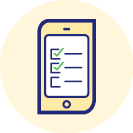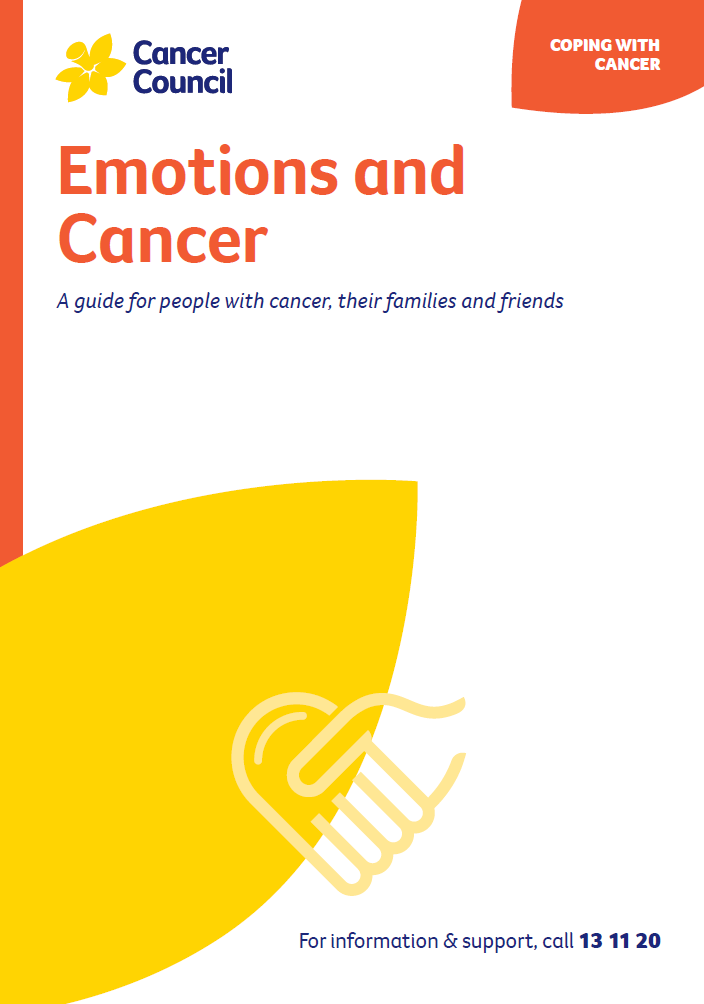- Home
- About Cancer
- Coping with a diagnosis
- Emotions and cancer
- Your coping toolbox
- Gathering information
Gathering information
When you are first diagnosed, there is a lot of information to take in – and well-meaning family and friends may give you even more. This “information overload” can leave you overwhelmed and confused about what to do. You may need just the information that relates to your situation right now, or a way of dealing with the information that you already have.
Look for reliable informationMake sure your information comes from recognised cancer experts and is based on strong evidence. Cancer Council has booklets, online information and podcasts about different cancer types, treatments and issues. Some information on the internet is not trustworthy – see a list of reliable websites. | |
Ask questionsIf you are unsure or confused about anything, it can help to talk to your treatment team. Write down your questions beforehand and put them in order of how important they are right now. See a list of suggested questions. You can also call Cancer Council 13 11 20 to discuss your concerns with an experienced health professional. | |
Involve other peopleAsk people you trust to help gather and make sense of new information. You could also ask your partner or a close family member or friend to come to your appointments with you. Let them know if you’d like them to take notes or join in the discussion. | |
Find out about suitable clinical trialsYour doctor or nurse may suggest you take part in a clinical trial. Doctors run clinical trials to test new or modified treatments to see if they are better than current methods. Over the years, trials have led to better outcomes for people with cancer. You can find clinical trials at australiancancertrials.gov.au. | |
 | Get organisedStart a filing system for all your test results, information and records. You also have the option of using My Health Record, an online system provided by the Australian Government. |
Keep a diaryYou can use a paper diary or smartphone app to keep track of appointments and side effects. This will also be a useful record in the future (especially if you are seeing different health professionals). | |
Update your affairsIf you haven’t already, check your insurance and superannuation policies and update your will and legal documents. Everyone needs to do this at some point – and knowing that your affairs are in order can be a relief.You can also check for any leave or insurance options that may be available to you. Cancer Council may be able to offer support – call 13 11 20 to find out more. | |
Find supportThere are many ways to connect with other people in a similar situation. Call Cancer Council on 13 11 20 for help finding a face-to-face or telephone support group, or to be put in touch with someone who has had a similar cancer experience.You could also join our online discussion forum. Find out more about support from Cancer Council |
The first thing is, I found it useful to read fact-based articles about the cancer I had. The second thing was doing physical activity that needs a high degree of concentration. And the third thing was talking in a peer group. I found those three things very useful in managing fear.
Matt
Podcast for people affected by cancer
Listen now
More resources
Dr Michael Murphy, Psychiatrist, NSW Health, and Conjoint Senior Lecturer, UNSW, NSW (clinical review); A/Prof Anne Burke, Co-Director, Psychology and Allied Health Lead, Cancer, Central Adelaide Local Health Network and The University of Adelaide, SA; Hannah Chen, Psychologist, Cancer Council Queensland; Hazel Everett, Clinical Nurse Consultant, Cancer Services, St John of God Subiaco Hospital, WA; Shona Gates, Senior Social Worker, North West Cancer Centre, TAS; Dr Jemma Gilchrist, Senior Clinical Psychologist, Mind My Health and Crown Princess Mary Cancer Centre, Westmead, NSW; Sandra Hodge, Consumer; Dr Michael Murphy (see above); Caitriona Nienaber, 13 11 20 Consultant, Cancer Council WA; Dr Alesha Thai, Medical Oncologist, Peter MacCallum Cancer Centre, VIC; Alan White, Consumer.
View the Cancer Council NSW editorial policy.
View all publications or call 13 11 20 for free printed copies.

